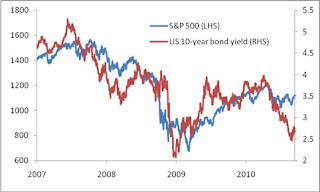(Macro Maestro couldn't resist this rather obvious title, even though he is generally in agreement with yesterday's regulatory announcements.)
On Sunday, the Basel Committee on Banking Supervision said it had finally agreed new capital requirements, which would be phased in over a number of years. (Largely to keep the Germans happy - what does this say about the state of their banking sector?). The headline was a rise in the minimum Tier 1 capital ratio from 4% to 6%, plus a new 'conservation buffer' of 2.5%. (Tier 1 capital is broadly shareholders' equity - the original purchase price of stock - plus retained profits minus cumulative losses.)
The 'conservation buffer' forces bank to hold additional capital as protection against unexpected shocks. If banks fall within this buffer they will face restrictions on dividends and bonuses. Officials don't want markets to regard this additional buffer as part of the new minimum, but it's hard to see how this can be avoided. So the minimum requirement effectively jumps from 4% to 8.5%.
Then, there is a new 'countercyclical' capital buffer. This means when credit is growing strongly, the conservation buffer widens further. At the height of the credit cycle, this would push the effective minimum capital requirement up by a further 2.5% to 11%.
These are big changes, so what do they mean? Macro Maestro will leave market strategists to work out the impact on the banking sector overall. But the reaction from the market so far is positive, with bank stocks jumping sharply. Presumably, this means either these regulations were less onerous than some had feared, or investors are celebrating the removal of one important source of uncertainty. (Pity about all the others..)
Still, Macro Maestro is more interested in the impact on financial stability. Here, he is reminded of two important pieces of research:
First, in its Q4 December 2009 Financial Stability Report, the Bank of England analyzed past financial crises to discover what they implied about the needs of future capital requirements. [Sweden, (1990-93), Finland (1990-94), Norway (1988-92) and Japan (1992-2004). Their work suggested Tier 1 capital ratios of around 8.5% would have been required to prevent government capital injections during those crises - bang in line with the new Basel minimum. This suggests to Macro Maestro that the new minimum is broadly right and certainly a vast improvement on what we had before.
Second, a UK
FSA paper found a countercyclical capital buffer could have powerful macro-prudential advantages by damping the lending cycle. They found a 3% point increase in capital requirements (broadly the buffer agreed by Basel) would reduce private-sector lending by around 5% after 3 years. This isn't a huge effect, but it might well be stronger if matched by tighter regulations in other countries (a global multiplier?). At the margin, this would have helped in the period 2005-07. But Macro Maestro believes policymakers should also introduce other policies to properly damp the credit cycle (eg higher interest rates even if inflation is low, stricter loan-to-value controls on mortgages).
Of course, we still need to know more on the detail (particularly when it comes to the countercyclical buffer) but to Macro Maestro these reforms seem to be moving in the right direction..






